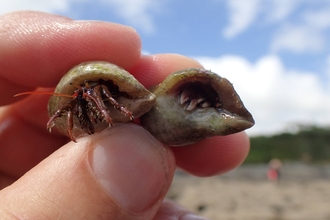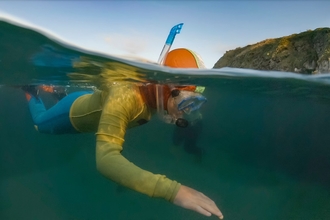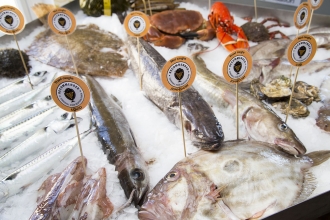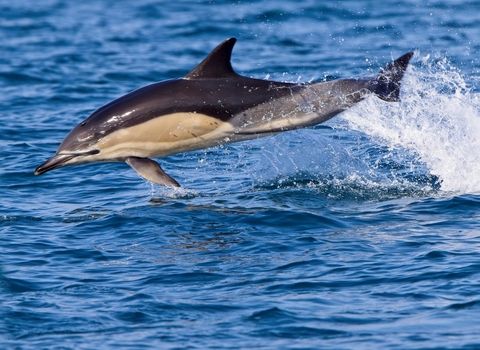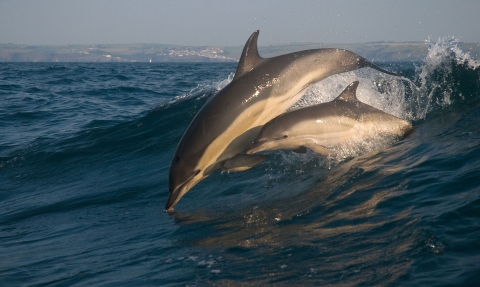
Common Dolphins off of Port Isaac, Image by Adrian Langdon
At Sea
Cornwall is home to some of the richest marine wildlife from tiny rare colourful corals to giant basking sharks, but our seas urgently need protecting.
Cornwall Wildlife Trust runs an extensive marine conservation programme known as ‘Living Seas’.
Cornwall Wildlife Trust runs a wide and varied range of marine projects to monitor our marine environment and get Cornwall engaged with the wonderful watery world that surrounds us.
- We collect data on marine wildlife and habitats
- We create awareness of the threats to marine life
- We campaign for better protection for our marine species and habitats
Sign up to our Living Seas newsletter to find out about marine news and events: sign up here
Living Seas projects
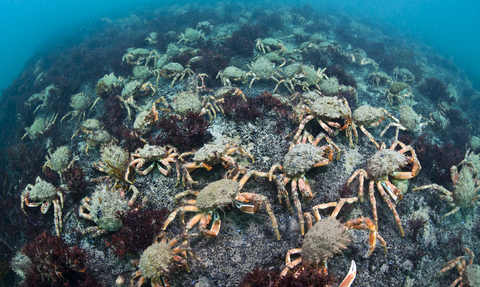
Mass gathering of spider crabs, Image by Alexander Mustard/2020VISION
Ocean Emergency Fund
Cornwall Shoresearch is a user-friendly and fun method of exploring the shore and recording the species and habitats found there. Shoresearch Cornwall has been run by Cornwall Wildlife Trust since 2012 and in this time we have carried out hundreds of surveys and have trained over 200 volunteers.
Seasearch is a national project for volunteer divers who have an interest in what they are seeing under water, who want to learn more and who want to help protect the marine environment. Cornwall Wildlife Trust is responsible for co-ordinating all Seasearch activities in the county.
Cornwall is a renowned hotspot for marine mega-fauna, particularly harbour porpoise, many dolphin species and sea birds, as well as many other marine life. The Seaquest Southwest project works to monitor marine mage-fauna found around the coast of the SW, and runs a series of systematic surveys, public events and talks aiming to monitor and protect these wonderful animals for a more rich and sustainable future. Cornwall Wildlife Trust coordinates the SW Bottlenose Dolphin collaborative project, to identify and monitor England's only resident pod of Bottlenose dolphin, with 28 individuals frequently seen around the coast of Cornwall.
Cornwall is a very popular place for ocean enthusiasts, but sadly increasing use of the seas is putting more pressure on the wildlife found here. Cornwall Wildlife Trust is part of the Cornwall Marine and Coastal Code group working to monitor and address the growing issue of marine wildlife disturbance and harassment in the county.
Cornwall sadly receives the highest numbers of dead marine mammal strandings each year for a single county in the UK. In response to this, the Marine Strandings Network has been run by CWT for over 25 years to record these animals, investigate the causes of death and tackle the threats our marine mega-fauna are facing.
CWT set up the Cornwall Good Seafood Guide to provide clear and accurate information to help us all make environmentally informed decisions when purchasing locally caught seafood. We are working with the fishing industry to promote the Cornish sustainable fish.
Since 2012, Cornwall Wildlife Trust has been running the Your Shore Network, working to set up ad support marine conservation groups all around Cornwall. These local groups of volunteers work to promote the marine environment, engage their local communities and carry out survey and monitoring in their local patch. The Your Shore Network of local marine conservation volunteer groups is continuing to expand and we aim to support and continue to grown this vital local network.
In 2016, Cornwall Wildlife Trust partnered with Cornwall Collage to run the Your Shore Beach Rangers project, funded by the Big Lottery Fund. This exciting new engagement project, creating and supporting a network of local marine groups around the county, whilst also focusing specifically on young people by recruiting and training Beach Rangers (local people aged 16 -24) to become active and long term members of this Cornwall’s Your Shore Network.
Campaigning for a beautiful blue future
Cornwall Wildlife Trust Marine Team work hard to give our Living Seas a voice. We work with locally and through the Wildlife Trusts nationally to put pressure on Government to ensure the marine environment the protection it needs to thrive.
Marine Protected Areas, including Marine Conservation Zones, are places at sea where environmentally-damaging activities, like certain types of fishing, are restricted. They are a tried and tested means of protecting habitats and wildlife at sea and there are many around the world. We work to ensure that Cornwall has the Marine Protected Areas it needs to ensure the amazing marine wildlife found here have the protection it needs.
Cornwall works in partnership with many other organisations to Tackle Marine Plastics, working as part of the larger national movement, including The Cornwall Plastic Pollution Coalition (CPPC), Clean Cornwall and supporting ReFILL Cornwall.
Marine Nature Recovery
Here in Cornwall our diverse marine wildlife is awe inspiring to see, and yet, many of these animals and the habitats that support them are under increasing threats from human induced pressures – pollution and poor water quality, disturbance from an ever-increasing use of our seas, development, and the destructive impacts of fishing, including accidental entanglement in fishing nets.
But there are solutions – we can help our seas and marine wildlife recover if we act now and use the evidence we already have and the tools we know work.
Marine nature recovery is needed to reverse past declines in wildlife and habitats and bring our seas back to life, so that they are healthy and thriving now and into the future for people, climate and nature. To rebuild the marine life-support systems that deliver the many benefits that society receives from a healthy ocean we need urgent action. This includes:
• A growing and resilient Marine Protected Area network designated and managed for nature conservation, including some Highly Protected Marine Areas
• Habitat restoration and creation within and outside the Marine Protected Area network to help restore ecological processes and connect marine wildlife populations
• Building resilience to climate change, including acting to protect, restore and expand vital ‘blue carbon’ assets and the ecosystem services that they provide
• Enabling people to enjoy, understand and connect with nature at sea, benefitting health and wellbeing
Cornwall Wildlife Trust have worked in partnership with Cornwall Council, and Natural England to look at how to progress marine nature recovery in Cornwall’s MPA network and the wider seas. As well as developing the thinking and methodologies to be applied to marine nature recovery work, a key part of the project has been in the evaluation of lessons learnt and recommendations for further work.
Coastal Partnerships
The Championing Coastal Coordination (3Cs) in Cornwall project researched whether a coastal partnership underpinned by a Coastal Based Approach would be an appropriate and cost-effective means for integrated place-based delivery for our coast.

